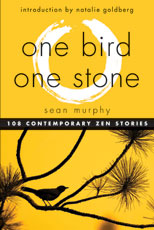Hats off to Hampton Roads for putting this extraordinary 2002 book back in circulation. There is a new introduction by Natalie Goldberg which rejoices as we do to see that thousands of new readers will be able to savor the great stories and anecdotes contained in One Bird, One Stone. John Murphy, a Zen student and an accomplished writer, shares 108 gems with us.
Inspired by the stories and dharma transmissions in Paul Reps' classic Zen Flesh, Zen Bones, Murphy has put together an eclectic collection of stories, quotations, and anecdotes drawn from the archives of the major Zen Buddhist centers in America and from interviews with their teachers and students. The paperback also provides an informal history of Zen Buddhism in the U.S. where there are an estimated one million practitioners.
As D. T. Suzuki revealed, Zen is an eccentric tradition with its emphasis upon iconoclasm, distrust of authority, and absence of ritual or dogma. Asian teachers who brought this tradition to America found a willing group of practitioners. Murphy writes about Shunryu Suzuki's beginner's mind, the Korean master Seung Sahn and his mantra "only don't know," Dainin Katagiri and his practice of bowing, and Philip Kapleau whose Rochester Zen Center was considered "boot camp" for Zen practitioners in its early years. These teachers and their dharma have shaped American Zen.
Natalie Goldberg once asked her teacher Dainin Katagiri: "What are sentient beings anyway? Are they things that feel?" He responded: "We have to be kind even to the chair, the air, the paper and the street. That's how big and accepting our minds have to become."
Near the end of this volume, Murphy discusses the unique contributions various Zen teachers including Bernie Glassman have made to engaged Buddhism. He also covers the distinctive takes American Zen masters have had upon practice in relationships, work, and encounters with other religions.
